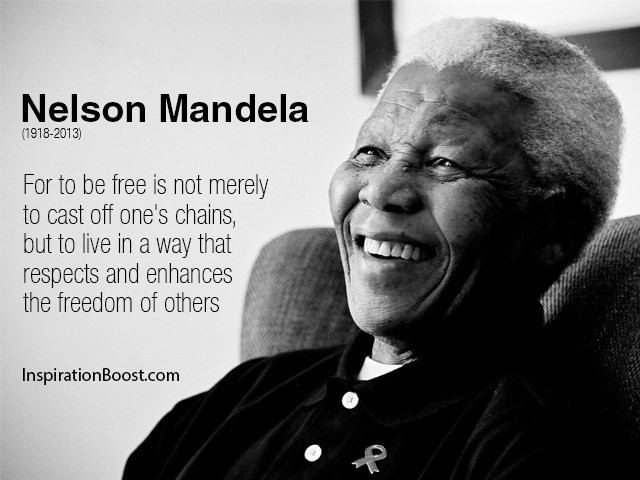
“For to be free is not merely to cast off one’s chains, but to live in a way that respects and enhances the freedom of others.” – Nelson Mandela
“Freedom is not worth having if it does not include the freedom to make mistakes.” ― Mahatma Gandhi
“Those who deny freedom to others, do not deserve it for themselves.” ― Abraham Lincoln
Freedom as an external condition is something we must fight to preserve in our country. To some degree, it is an issue in every nation on earth. We continue to pray for those people and nations where personal freedoms are denied or repressed. In America, some of our immigrants have come from countries who are notorious for suppressing the people, denying freedoms, and even mass murdering their own citizens.
I believe we should be proud to offer a better environment in our nation. Yet even in America, there are strides that need to be made as we seek to rid our society of prejudice. Although we are based on freedom, nevertheless, it is not always available as it should be. The words of Nelson Mandela above are a reminder that desiring freedom for oneself cannot be a valid pursuit without also demanding freedom for all. Lord, please help us achieve freedom for all.
There is, however, another experience of freedom that surpasses the notion of political freedom as described in our constitution. That is the inner experience of freedom, which is a gift from God. This type of freedom can be had whether we live in a free country or not.
In his book Man’s Search for Meaning, Viktor Frankl describes his experience in a Nazi concentration camp during World War II. Many times, he and others were marched around, tortured, stripped naked, and degraded. During one of these moments he had a revelation that there was one thing that could not be taken away from him … his thoughts.
“Everything can be taken from a man but one thing: the last of the human freedoms—to choose one’s attitude in any given set of circumstances, to choose one’s own way.” ― Viktor E. Frankl, Man’s Search for Meaning
This is the freedom of which Jesus spoke, “Then you will know the truth, and the truth will set you free.” (John 8:32) It is available to all, regardless of their race, culture, national origin, or political system under which they live. Freedom through Christ cannot be taken from us, as it is planted in us by the Holy Spirit through salvation.
“It was for freedom that Christ set us free; therefore keep standing firm and do not be subject again to a yoke of slavery.” – Apostle Paul (Galatians 5:1)
What does this mean … “for freedom Christ set us free”? Well, it is possible to be free, but not feel free. I have heard that a baby elephant is tamed by being put on a rope leash attached to a stake in the ground. It learns immediately that it cannot escape because the stake is strong enough to hold it back from running loose. However, as the elephant grows it retains this feeling of captivity when it is staked to the ground as an adult, even though the elephant is eventually strong enough to pull the stake out of the ground easily. It doesn’t even try, because in its mind, it believes it is a captive.
But for us, it must be different. We must believe that Christ has truly set us free. Paul says this in Romans 8:1 … Therefore, there is now no condemnation for those who are in Christ Jesus, because through Christ Jesus the law of the Spirit who gives life has set you free from the law of sin and death.
And in John 8:36 we read … So if the Son sets you free, you will be free indeed.
I am thankful for our freedom as a nation. I pray that this freedom will be applied to all. And I am especially thankful for my freedom in Christ. Unlike the freedoms of this world, my freedom in Christ can never be taken from me.
Blessings,
Chaplain Mark